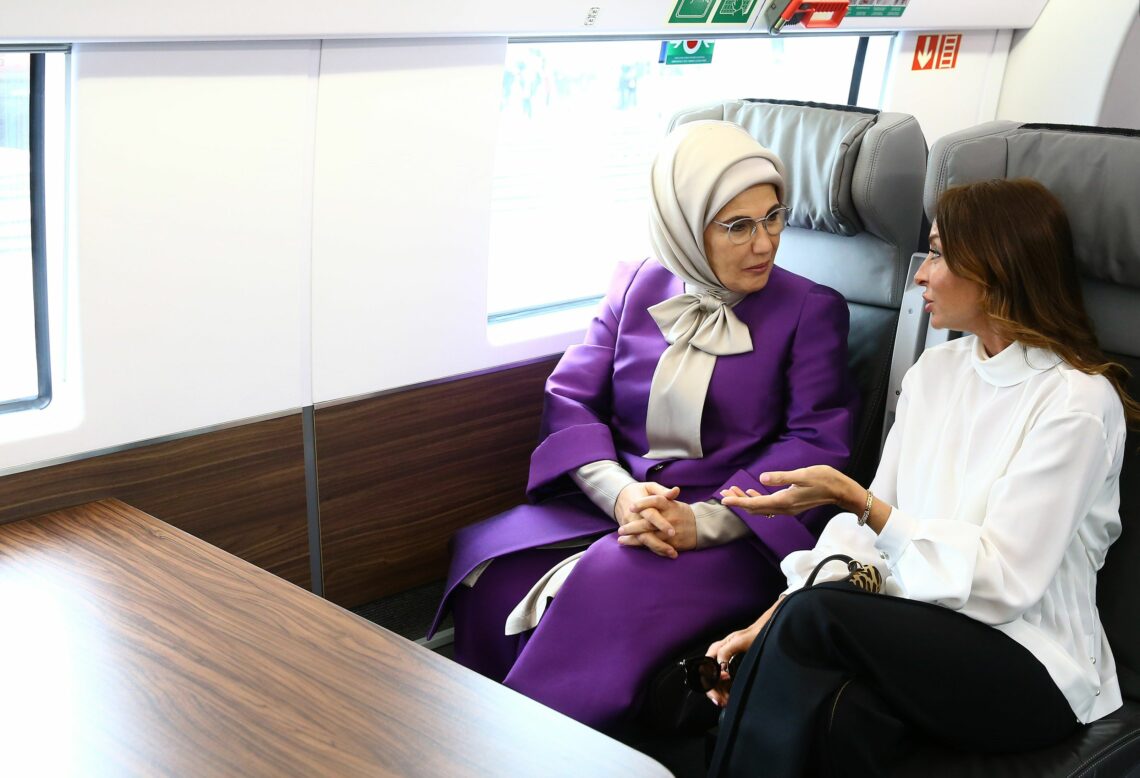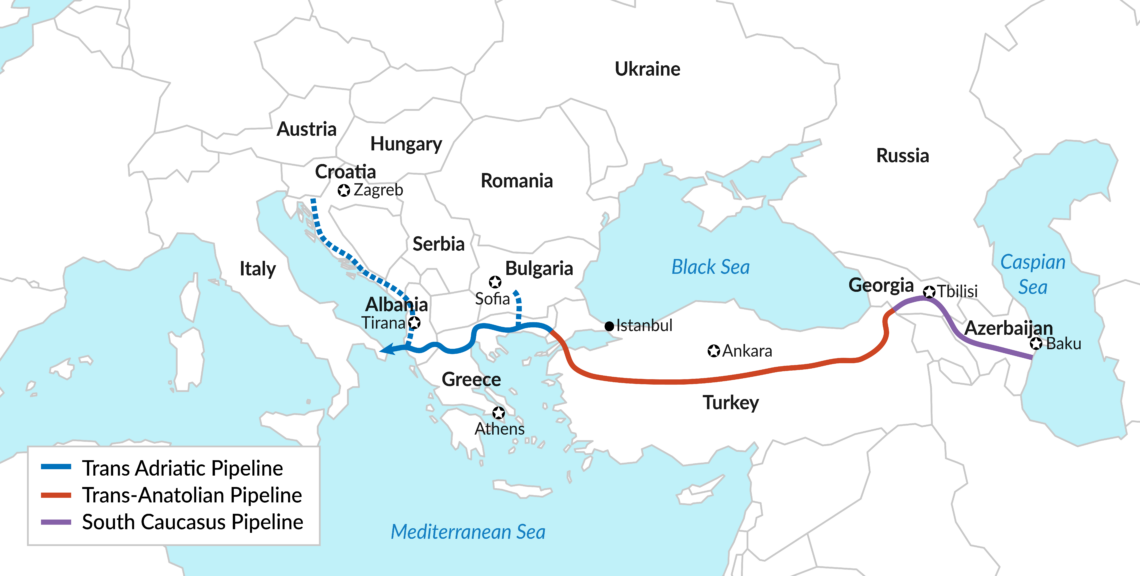Georgia is slowly moving into Turkey’s orbit
In the aftermath of recent fighting in Nagorno-Karabakh, Turkey’s influence in the Caucasus is growing. Georgia could soon find itself seeking security guarantees from Ankara instead of Western organizations – a worrisome development for both Washington and Moscow.

In a nutshell
- Turkey's influence in the Caucasus is increasing
- Georgia could become a close Turkish ally
- U.S. influence in the region is declining
Ever since its Rose Revolution in 2003, Georgia has been at the forefront of the increasingly bitter confrontation between Russia and the West. It kicked off the wildfire of “color revolutions” that so frightened the Kremlin. And Tbilisi has been a steadfast partner of the United States, providing troops for the wars in both Iraq and Afghanistan.
Georgia’s stubborn determination to move into the Western sphere of influence has been met by brutal retaliation from Russia. The six-day war in 2008 drew a red line for further NATO expansion. And the subsequent Russian recognition of the breakaway republics Abkhazia and South Ossetia amounted to a partial dismemberment of the Georgian state.
Although Ukraine has since emerged as the main arena for confrontation between Russia and the West, the standoff over Georgia is still a crucial element in South Caucasus geopolitics. Turkey has now entered the fray. If President Recep Tayyip Erdogan brings Georgia into his sphere of influence, it will have major implications.
Trilateral alliance
The most immediate consequence of the six-week war over Nagorno-Karabakh was to fundamentally recalibrate the relationship between Turkey and Russia. Ankara has now emerged as a regional great power, and Moscow has been left to shore up and redefine its role. While the Kremlin’s failure to keep the conflict frozen was a major setback, in compensation it now has troops on the ground across the region – in addition to its military base in Armenia, and its occupation troops in Abkhazia and South Ossetia, as well as peacekeepers in Azerbaijan.
Although Georgia was not directly involved in Nagorno-Karabakh, its geographical position ensures that it will play a vital role in the alliance between Ankara and Baku. The oil and gas pipelines that run from Azerbaijan to Turkey go through Tbilisi. Turkey’s growing influence in the Caucasus can be shown by its development to becoming a regional energy hub. In June 2018, with the Trans-Anatolian Natural Gas Pipeline (TANAP), Ankara gained control of the Southern Gas Corridor (SGC) that pumps gas from the Caspian Basin into Southeastern Europe.
Georgia’s stubborn determination to move into the Western sphere of influence has been met by brutal retaliation from Russia.
Turkey, now less dependent on Russian gas, has grown closer to Georgia and Azerbaijan. The perceived need to provide security for energy infrastructure, especially after the Russo-Georgian war in 2008, has in turn evolved into military cooperation. The first step toward a trilateral alliance was taken in 2007, during an official visit to Georgia by Azeri President Ilham Aliyev. With the 2012 Trabzon Declaration, the groundwork was laid for the conduct of joint military drills. In 2017, the Caucasian Eagle exercises were first staged, at the Vaziani Military Base near Tbilisi. In October of the same year, the Baku-Tbilisi-Kars railway line was opened, providing an important link in the rollout of the Chinese Belt and Road Initiative.
Then came the conflict in Nagorno-Karabakh, which showed how vulnerable these transport arteries are to shelling from Armenia. Turkey can therefore be expected to provide increased military support not only for Azerbaijan, but perhaps also Georgia.
To date, bilateral relations between Turkey and Georgia have been broadly in line with the latter’s ambition to achieve closer integration with the West. As a leading trading partner and a significant source of foreign investment, Turkey’s influence in Caucasus is further solidified. Ankara has long been in favor of including Georgia in NATO, and has been providing military assistance so that the country’s armed forces meet the transatlantic organization’s standards.
As long as Turkey had strong ties to the West, and shared concerns about Russia, the situation was well in line with U.S. security interests, including the U.S.-Georgia Special Forces cooperation. But the increasing rift between Turkey and the West casts dark shadows. It is especially ominous that Pakistan was invited to join the Caucasian Eagle 2019 drills as an observer.
Waning influence
For Washington, none of this is good news. In November 2020, U.S. Secretary of State Mike Pompeo visited Georgia. He reiterated U.S. support for the country’s sovereignty over the breakaway territories of Abkhazia and South Ossetia and for its aspirations to join important Western structures like NATO. The main question for Tbilisi is how much such verbal assistance is worth. The U.S. has every incentive to seek to rebuild influence in the South Caucasus, but this may prove easier said than done.
Part of the reason is that the situation in Nagorno-Karabakh has created new military realities. During his visit to Tbilisi, Secretary Pompeo issued a statement calling for the peaceful settlement of the Armenian-Azerbaijani conflict through international mediation. Yet, a week before his arrival, Russia had already deployed its peacekeeping troops to enforce the cease-fire it had brokered.
Facts & figures

The U.S. has been a co-chair of the Minsk Group since its creation in 1992, together with France and Russia. But further management of the conflict now rests with Moscow and Ankara, eroding U.S. influence in the region.
The Biden administration will face challenges reminiscent of past efforts in Georgia and Ukraine. While promoting democracy and a rule-based market economy, U.S. officials will have to work with local oligarchs who have parallel agendas of self-enrichment. As recent developments in Georgia have highlighted, this type of cooperation may not have the expected outcome.
Faltering democracy
The figurehead for the American vision in Georgia is President Salome Zourabichvili, a former French diplomat who holds dual French and Georgian citizenship and has degrees from elite schools like Sciences Po Paris and the School of International and Public Affairs at Columbia University. In office since December 2018, she has been a tireless advocate of closer relations between Georgia and the West. In a comment on the visit by Secretary Pompeo, she concluded that “This means that there will be more of America in Georgia and in the region,” and added that American presence is “extremely important to us.”
However, the political landscape surrounding President Zourabichvili is dominated by other forces. On one side is the billionaire businessman Bidzina Ivanishvili, who made his fortune in Russia. Having moved back to Georgia in 2003, he went on to be elected prime minister in October 2012. Although he stepped down after a mere 13 months, claiming to have fulfilled his mission, his political party, Georgian Dream, still governs. Operating behind the scenes, Mr. Ivanishvili has been accused of feathering his own nest.
Congress could grow tired of funding a failing pro-democracy agenda.
On the other is Mikheil Saakashvili, a lawyer who emerged as the victor in the Rose Revolution. During his two terms as president, from 2004 to 2013, he effectively implemented an anti-corruption program for the traffic police, but overall his battle against graft was less successful. In the 2012 parliamentary elections, his political party lost against Georgian Dream. When his second presidential term expired, in 2013, he went into exile and was subsequently sentenced in absentia for abuse of power.
In October 2020, Georgian Dream secured a slim majority in parliamentary elections. The main opposition party, the United National Movement, had possibly miscalculated by nominating its leader, Mr. Saakashvili, as a candidate. This ensured that the election would be a shootout between the country’s two main political heavyweights. Claiming election fraud, all opposition parties jointly refused to take their seats.
In a comment on the outcome, the U.S. Embassy noted that while “efforts to corrupt the electoral process through voter intimidation, vote buying, interfering with ballot secrecy, blurring of party and official activities, and violence against election observers and journalists,” had not been sufficient to invalidate the results, they “continue to mar Georgia’s electoral process and are unacceptable.”
In such circumstances, American security officials may still attempt to maintain a foothold in Georgia to counter growing Russia’s and Turkey’s influence in Caucasus, but Congress could grow tired of funding a failing pro-democracy agenda.
Scenarios
Turkish soft power in Georgia will become a concern for Moscow and Washington. Up until the most recent fighting in Karabakh, this may not have appeared overly important. Today it is. President Erdogan’s rise and strong emphasis on pan-Turkism and Islamist values herald the advent of a new geopolitical reality.
In 2016, he declared that “Turkey is not just Turkey,” adding that his country was “responsible to the hundreds of millions of our brothers in the geographical area to which we are connected by historical and cultural ties.” In a New Year’s address for 2021, he compared current Turkish military interventions to the creation during World War I of the Islamic Army of the Caucasus by Enver Pasha, the Ottoman war minister.
His approach to Georgia has followed a well-established pattern of building influence in Europe by investing in mosques, networks of pro-Turkish public organizations and humanitarian projects that support the spread of Islam. These networks operate under the umbrella of the Turkish Cooperation and Coordination Agency, which is often alleged to act as cover also for the country’s national intelligence organization.
Turkish organizations have pursued active missionary work in Georgia since the beginning of the 2000s, and the results are tangible. Muslims currently make up about 10 percent of the population and their number is growing. In the two south-eastern regions that are home to the bulk of the country’s Azeri minority, through Turkey's influence on Caucasus, it yields active assistance from Azerbaijan. President Erdogan’s ambition to promote Islam across the South Caucasus stands at loggerheads with Western ambitions to support civil society programs. The outcome of this rivalry could lead to further estrangement from the West and to an even deeper wedge inside NATO.
While Russia may have good reason to welcome these developments, it must consider the implications of Turkey’s joint military activity in the South Caucasus, which also includes Pakistan. The Russian military base in Gyumri, Armenia could become surrounded by Turkish allies. Georgia could begin seeking security guarantees from Turkey rather than from the United States. Given the recent deterioration in relations between Turkey and Russia, Moscow and Washington may find common ground in trying to prevent this outcome.







